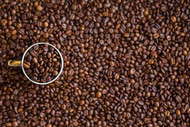What is Caffeine Anhydrous? Benefits, Risks, Comparisons Explained
By on Nov 16th 2023
Caffeine is a naturally-occurring central nervous system stimulant found in approximately sixty plant species. The most common sources for natural caffeine are the beans from coffee plants and the leaves of tea plants. It can also be synthesized in a lab using dimethylurea and malonic acid.
But caffeine is present in a number of products beyond those that are made with coffee and tea. Outside of lattes and shots of espresso, caffeine is a common ingredient in energy drinks and bars, pre-workout powder, and diet pills, for example. These foods, beverages, and supplements are caffeinated using caffeine anhydrous.

What is caffeine anhydrous?
Caffeine anhydrous is derived from the same plants as caffeine. In fact, caffeine anhydrous and caffeine are essentially the same thing. The difference is that when it comes to anhydrous caffeine, all additional chemical components and water are filtered out in a lab. Anhydrous means, by definition, containing no water.
When the water is removed, what remains is a white crystalline powder known as caffeine anhydrous.
Dehydrated caffeine works the same was as caffeine from a natural source. When consumed, this stimulant impersonates adenosine, a neurotransmitter. When this chemical binds to certain receptors in the brain, it creates symptoms of grogginess. Caffeine binds to some of those same receptors and works as an antagonist to adenosine; caffeine prevents too much adenosine from binding, which keeps you feeling awake for longer.
Caffeine anhydrous is also a proven performance enhancer in activities like running and cycling. Recent studies are still trying to determine whether coffee can be equally effective. The NCAA currently restricts caffeine intake for collegiate athletes (the equivalent to six cups of coffee), but since 2003, the World Anti-Doping Agency (WADA) does not.
Caffeine anhydrous safety
This odorless, white crystalline powder is much more concentrated than what you’d find in a cup of coffee. The Mayo Clinic and the FDA agree that the safety level for most non-pregnant adults is 400 milligrams of caffeine. Caffeine overdose is possible, which can result in caffeine intoxication, which is over-stimulation of the central nervous system.
At Ingredi, we carry pure caffeine anhydrous intended as a pharmaceutical ingredient and food/beverage additive. Due to its potency, it should not be consumed alone in its pure form. One teaspoon of pure powdered anhydrous caffeine is equivalent to 2700 milligrams of caffeine—that’s roughly 28 cups of coffee.
The natural consumption is regarded as safe and generally, individuals consuming normal levels of caffeine will not see any severe side effects. However, tolerance level and consuming more than the recommended doses of caffeine can lead to side effects. Some side effects of heavy caffeine use include but are not limited to headaches, insomnia, nausea, anxiety, and stomach upset. Individuals who are pregnant or breastfeeding should avoid caffeine anhydrous.
You can shop caffeine anhydrous for all your beverage, food, and pharmaceutical needs at ingredi.com.
Sources:
https://www.verywellfit.com/is-caffeine-anhydrous-the-same-as-caffeine-4161151
EFSA NDA Panel (EFSA Panel on Dietetic Products, Nutrition and Allergies), 2015. Scientific Opinion on the safety of caffeine. EFSA Journal 2015;13(5):4102, 120 pp. doi: 10.2903/j.efsa.2015.4102






